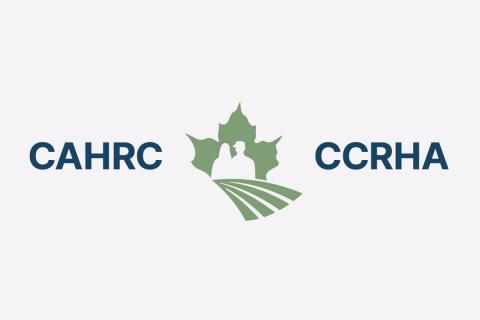Ottawa, ON – Mary Robinson of Prince Edward Island, has been acclaimed the new Chair of the Canadian Agriculture Human Resource Council (CAHRC), replacing Mark Wales of Ontario. Rounding off the Board's Executive are Cyr Couturier (NL) as Vice Chair, Harold Deenen (ON) as Treasurer; and Connie Keller (SK) and Paul Glenn (ON) - all for two year terms.
Robinson's family has been farming in Augustine Cove, PEI since 1810. Along with her two cousins, Lori and Andrew, she actively manages Eric C. Robinson Inc. and its subsidiaries. The operation, a sixth generation farm and third generation family agri-business, was recognized in 2014 as one of PEI's Heritage Farms. Eric C. Robinson Inc. currently grows potatoes, grain, soybeans and hay. Other facets of the family business include grading and packing fresh potatoes, a produce dealership, custom application and crop input businesses. Mary is also a Certified Crop Advisor and actively manages Island Lime Inc.
In addition to Robinson's new position at CAHRC, she is the past president of the PEI Federation of Agriculture, has been newly named to the Canadian Federation of Agriculture's Board and sits on the CFA's Governance and Carbon Tax committees. She is a member of the National Program Advisory Council for Agriculture, is the lead for CFA's work on the Food Policy for Canada and has just accepted a position on the Canadian Centre for Food Integrity Board.
"The path is well laid out for CAHRC. We need to continue to bring valuable human resource assistance to the national table, pushing traditional thinkers to be creative and helping facilitate a better understanding of what career opportunities agriculture offers," says Robinson. "CAHRC will continue to have a multi-angled approach to this; capturing the attention of employers, educators, potential workers and the general public. As we hear people talk about "public trust", "food policy" and "sustainability", Ag HR has a strong role to play in these arenas. The messaging we send out will be taken in by the general public as part of the journey to building trust and understanding between agriculture and non-agriculture communities."
While Robinson is the fourth Chair in CAHRC's 10 year history, she is the first woman, which reflects a growing upward long-term trend of women in agriculture. Statistics Canada indicated that in 2016, women accounted for 29 per cent of farm operators national wide. However, CAHRC research indicates that the proportion of women on boards is not representative of the proportion of women in the industry. Of 65 national and provincial agricultural associations reviewed by CAHRC research, only eight had women as the Board Chair or President, and another eight had women in the 'second in command' role of Vice-President or Vice-Chair. Representation of women on board executive committees was slightly better with 18 of the 65 organizations having at least one woman on their board.
One of the projects that CAHRC manages is Supporting the Advancement of Women in Agriculture (SAWA), for which CAHRC has developed a tool for associations entitled, Is Your Board Representative: A Best Practices Guide to Ensuring Women are Included, to work through processes to improve diversity.
“Our aim is to help improve diversity within the industry and increase the number of women on agricultural association boards and in leadership positions. Diversity and inclusion are central to the future success of the industry,” explains Portia MacDonald-Dewhirst, Executive Director of CAHRC. “To accomplish this, we have developed a guide that provides a step-by-step process that industry associations can follow to assess their current situation and identify new ways to encourage the full participation of women in leadership roles. The industry will be at its best when all perspectives are included.”
As Robinson heads into a new decade for CAHRC she summarizes, "In these next 10 years, CAHRC will fill an even more integral position in helping Canada do an effective job of assisting our agricultural employers satisfy its human resource needs; helping outfit those businesses with the skilled people needed to maximize agricultural sustainability and economic success. Canada is aiming to capitalize on the Barton Report, develop a Food Policy for Canada and step up to the responsibility of being one of only a handful nations able to export food, helping feed the world. Canadians have a moral obligation to get organized and be prepared to make the best use of our resources - land, soil, air, water and people. Canada needs CAHRC to continue to be the champion of Ag HR and best prepare our people for the job."
